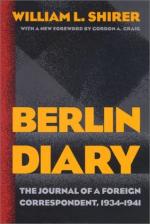
|
| Name: _________________________ | Period: ___________________ |
This test consists of 15 multiple choice questions and 5 short answer questions.
Multiple Choice Questions
1. What strain did Shirer say began to take a toll on the German people?
(a) Lack of coal.
(b) Lack of sleep because of the bombing.
(c) Lack of oil.
(d) Lack of food.
2. How did Germany justify their entering Holland, Belgium and Luxemburg?
(a) They were supporting France and Britain.
(b) They were planning on invading Germany.
(c) England and France were planning to invade through them.
(d) They were not supporting Germany.
3. How many Parisians fled Paris in June 1940?
(a) 4 out of 5 million.
(b) 3 out of 8 million.
(c) 3 out of 5 million.
(d) 1 out of 5 million.
4. Who was Germany's main supplier of iron in 1940?
(a) France.
(b) The U.S.A.
(c) Denmark.
(d) Sweden.
5. What did the Germans hope the Americans would do in the territories occupied in 1939-1940?
(a) Supply money.
(b) Supply food.
(c) Supply oil.
(d) Supply lodging.
6. What did Shirer notice about the Dutch and Belgium retreat?
(a) They did not blow up the bridges.
(b) They did not lay land mines.
(c) They did not form partisan groups.
(d) They did not attack Germany's rears.
7. When did Tess and Eileen depart Geneva?
(a) October 24, 1940.
(b) October 23, 1941.
(c) October 23, 1940.
(d) September 23, 1940.
8. What did the Germans do in retaliation for the bombing of Berlin?
(a) They stopped offering humanitarian aid.
(b) They executed prisoners of war.
(c) They bombed London.
(d) They stopped taking prisoners.
9. Where was Shirer on September 16, 1940?
(a) In London.
(b) In Geneva.
(c) In Prague.
(d) In Paris.
10. What did Shirer say the Berliners knew about Nazi propaganda after the first bomb drop on Berlin?
(a) They were being lied to.
(b) They were vulnerable.
(c) The war was started.
(d) The Luftwaffe was not as powerful as they thought.
11. What were the prisoners promised for removing the time bombs dropped by the British?
(a) Better food.
(b) Better accommodations.
(c) Release.
(d) A quick death.
12. When did Hitler offer peace to Britain?
(a) July 15, 1940.
(b) July 15, 1941.
(c) June 15, 1940.
(d) July 19, 1940.
13. What country does Italy march into on October 23, 1940?
(a) Morocco.
(b) The Levant.
(c) Greece.
(d) Syria.
14. Why didn't Shirer want Tess to leave through Paris?
(a) Germans would reach it before she did.
(b) It was too much of a trip for her and the child.
(c) Paris was full of fleeing civilians.
(d) There was no plan for Spain in Paris.
15. When did Shirer return to Berlin after the armistice signature between France and Germany?
(a) June 27, 1940.
(b) June 28, 1940.
(c) July 27, 1940.
(d) June 27, 1941.
Short Answer Questions
1. What did General von Reichenau command on May 20, 1940?
2. What did Shirer say the German newspapers announced on May 9, 1949 according to Part II, pgs.331-369?
3. When did the German press announce that the troops were ready to attack Britain according to Part II, pgs. 451-492?
4. Who did Shirer meet at the hotel after arriving in Paris in June 1940?
5. When were the Germans entering Holland, Belgium and Luxembourg?
|
This section contains 474 words (approx. 2 pages at 300 words per page) |

|




